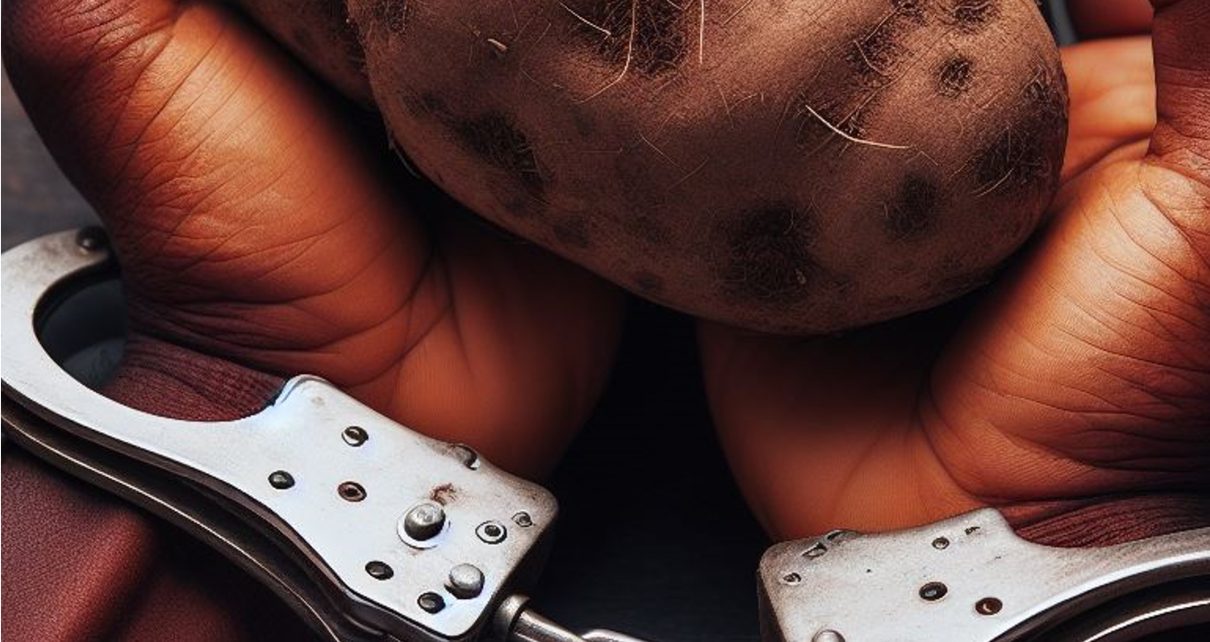
It is becoming increasingly dangerous to be poor. Don’t believe the yarn that all men are equal. Is the man eking out a living on a tired patch of earth on the desert fringes of Katsina equal to his compatriot luxuriating in the cosy embrace of Abuja without a visible means of livelihood?
The law behaves like society, too. There is one law for the rich and another set for the poor. Nowhere is this more apparent than in contemporary Nigeria where people are being made to feel that it is a crime to be poor. If being poor is a crime, imagine what now happens to a poor man found committing an offence.
One can argue that there are poor people all over the world and that no human society has yet succeeded in getting rid of relative poverty among its populace. But what would be the justification for having different scales for measuring the same infractions from the rich as against the poor?
Poor Man’s Burden
Look at the case of 30-year-old Citizen Mande Zaki of Kuta, Shiroro Local Government Area of Niger State, who was recently sentenced to a two-year jail term for stealing a tuber of yam. He was, in addition, ordered to pay a fine of N1,000 for trespass. Zaki had spent some time in prison awaiting trial. It seemed luck was finally on his side when the Niger State Chief Judge, Justice Halima Ibrahim Abdulmalik embarked on a prison decongestion visit to correctional centres in the state.
When asked if he actually stole the yam, he confessed that hunger had driven him to do it: “It is true that I stole a tuber of yam because I was very hungry. I was in search of my goat and I entered the farm. This is the first time I am getting involved in this kind of problem. I have never stolen anything before. I was hungry and this pushed me to steal the yam, please have mercy on me.”
The “mercy” that the law would have on him was a sentence of two years in the slammer. On the instruction of the chief judge, the chief magistrate summarily tried and convicted him.
In a society where all men are supposedly equal before the law, it is difficult to reconcile the fate of Citizen Zaki with that of his ‘fellow countryman’, John Yakubu Yusuf, a former assistant director in the federal civil service, who was tried on a 20-count charge alongside his Permanent Secretary, Atiku Abubakar Kigo; a director, Ahmed Inuwa Wada; a cashier, Veronica Onyegbula; and an ICT officer, Sani Habila Zira.
Mr Yusuf had pleaded guilty to counts 19 and 20 involving betrayal of trust and the conversion of N1 billion on each count, to personal use. In a country where a man could be sentenced to jail for two years on account of stealing a tuber of yam, the maximum penalty for the offence of stealing N2 billion pensioners’ funds is two years!
After the theatrics of appearing stern, the judge of the Federal Capital Territory High Court, Gudu, Abubakar Talba, pronounced the two-year jail sentence with a N250,000 option of fine. The convict is forfeiting a property valued at N325 million traced to him by the Economic and Financial Crimes Commission, EFCC.
One Country, Two Laws
So, there you have it: One Nigerian goes to jail for two years for stealing a tuber of yam while another convicted of stealing N2 billion pays a fine of N250,000, forfeits a property of N325 million and goes home a free man to enjoy the rest of his loot. Most Nigerians can’t wrap their heads around such a one-handed notion of justice where everything is loaded against the poor.
It can’t be a coincidence that the elite of society constitute the legislature at every level of governance. So, they make laws that favour the rich or the politically connected. In addition, it is increasingly becoming obvious that many of the judges currently in service are spouses, children or close relatives of politically exposed persons. Between these two, the eminent thief is assured of soft landing whenever the law decides to use him as a token sacrifice to assure the public that a slap on the rich man’s wrist is the very equivalent of justice.
The moral? Before you decide to steal, ensure that the sum is big enough to enable you hire a senior advocate, grease the judicial path and still have enough to live happily ever after. The gallows and swords of amputation are reserved for petty thieves. Remember the case of Bello Buba Jangebe of Sharia-compliant Zamfara State whose hand was amputated in 2000 for stealing a cow?
It is as if we are a society of ‘one day, one trouble’. When there seems to be no trouble, or when everywhere seems at peace, some demons are activated to rouse us from our complacent reverie. Kidnapping for ransom was becoming so commonplace that it wasn’t really making the front pages again unless some touch of bestiality or savagery was involved. Then we are all roused. Dr. Tai Solarin warned us decades ago that we must always decry and rise against every crime and that every death matters. According to him, one of the worst things that could happen to the society was unshockability— when frequency of occurrence numbs your sensibility.
Beyond Shock
So, kidnappers roused us from our sleep with the recent killing of Nabeeha Al-Kadriyar to force the family to pay ransom. Then news came from Ekiti State that kidnappers had killed two traditional rulers in a failed kidnap attempt. The Elesun of Esun-Ekiti, Oba David Babatunde Ogunsakin, and the Onimojo of Imojo-Ekiti, Oba Olatunde Samuel Olushola, were killed by the gunmen while the Alara of Ara-Ekiti, Oba Adebayo Fatoba, escaped. It has since been revealed that Oba Olatunde Olusola of Imojo-Ekiti was on track to becoming a professor within a year before his untimely death.
And perchance we still were not bestirred enough by the sacrilege of spilling royal blood in such gruesome circumstances, another band of kidnappers on the same day abducted five school children of Apostolic Faith Group of Schools, Emure Ekiti, from their school bus together with some staff of the school.
The principal of the school related how the bandits were playing psychological games with the family of the hostages: “The kidnappers have started to maltreat the abductees … They called the parents of the pupils who were abducted and the husband of one of the women. We were told that during their calls, they heard how they were flogging the children and the way they were crying to call the attention of the parents…”
Imagine torturing children to force their parents to find, by whatever means, millions of Naira to satiate the satanic lust for money by common criminals!
And in neighbouring Kwara State, the police command confirmed the gruesome killing of a traditional ruler in the state, Oba Peter Aremu, the Onikoro of Koro-Ekiti in Ekiti Local Government Area. The police disclosed that “The gunmen invaded the residence of the traditional ruler in the evening and killed him and went away with his wife”.
It seems that criminals are finally levelling the field of victimhood. No matter the status, tribe, age, and gender of the abductee, we are all potential hostages under enforced equality and foreboding hopelessness in this vast forest of a thousand demons.
Until we establish state and local government constabulary to augment this unitary police force pretending to be on top of the security situation, it is clear that this will not be the last report on the scourge of kidnappings ravaging the 36 states of Nigeria. The choice is ours.
- Wole Olaoye is a Public Relations consultant and veteran journalist. He can be reached on wole.olaoye@gmail.com, Twitter: @wole_olaoye; Instagram: woleola2021



